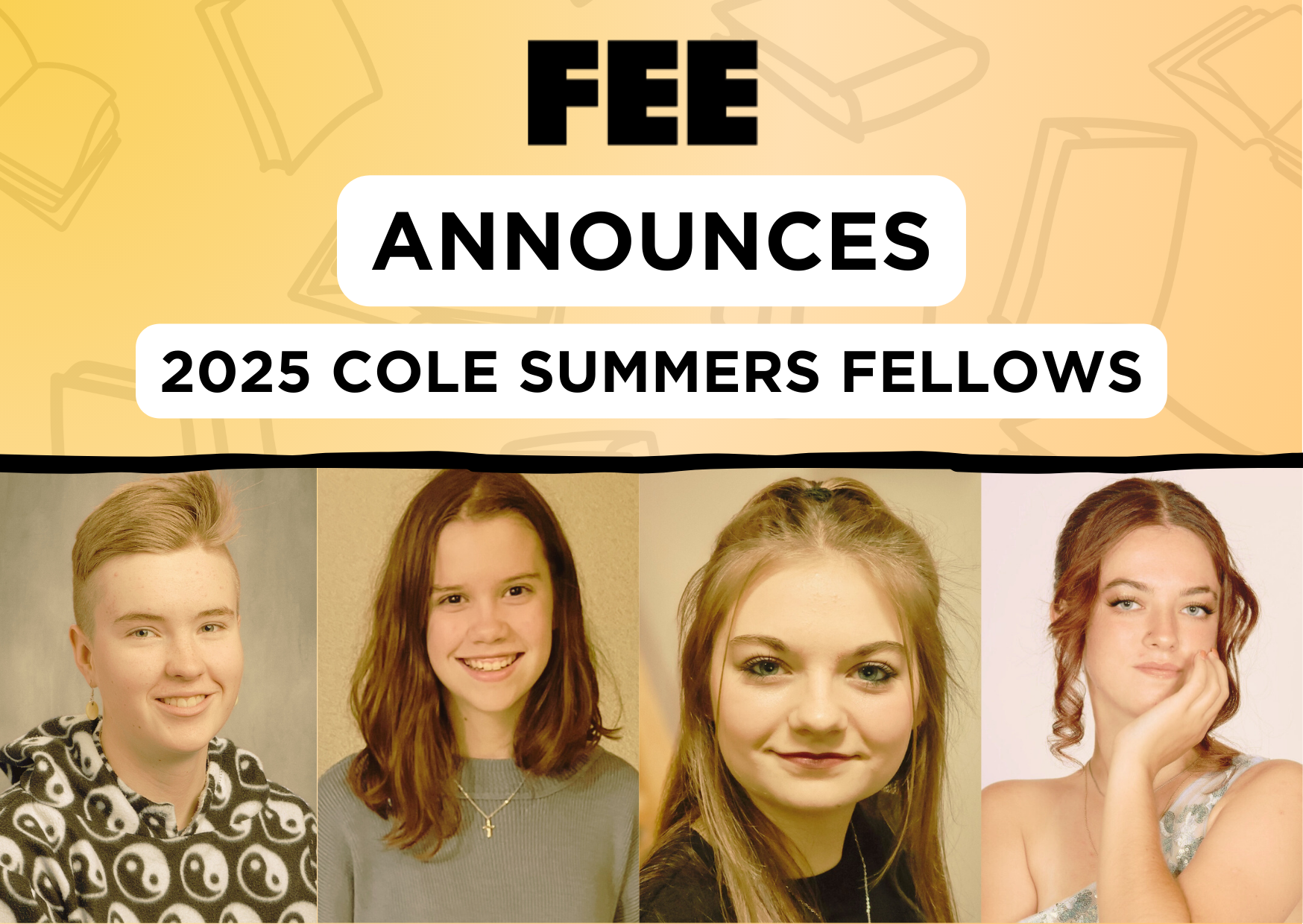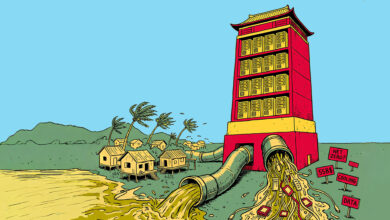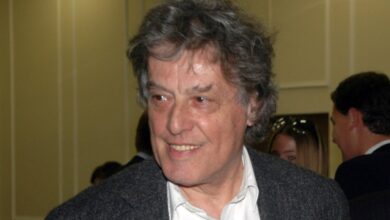Meet the 2025 Cole Summers Fellows

The number of unconventionally-schooled K-12 students continues to rise as more families grow wary of the public educational system and look for alternatives. Momentum grew due to school closures during Covid-19, yet even as the pandemic becomes more part of our past than our present, educational alternatives continue to pop up across the country. The demand for information on how to find and launch these programs continues to grow as well. Most of all, there has been a large increase in the market for programming designed for unconventionally-schooled teens, especially the kind which would help them connect and share their stories with others.
FEE is answering the call. Late last year, FEE announced the launch of a new initiative called the Education Entrepreneurship Lab, led by FEE Senior Fellow Kerry McDonald. In addition to the existing brand of LiberatED, this initiative included a variety of new programs, such as the Enterprising Founder Award and the Entrepreneur-in-Residence programs. Moreover, the Cole Summers Fellowship was renewed for a second year as a part of the Education Entrepreneurship Lab, and I couldn’t be more excited!
The Cole Summers Fellowship, named after the late teenage entrepreneur and unschooler Kevin Cooper (who used the pen name Cole Summers), looks to honor his legacy by inspiring the next generation of unconventional education advocates and innovators. Fellows will be empowered to use their voices to enact change and expand people’s understanding of unconventional education. Summers’s memoir, Don’t Tell Me I Can’t, talks a lot about his experiences with being Unschooled and why youth should not be limited by traditional societal expectations. His story stands as a shining example of the power of unconventional education, self-directed learning, and youth innovation; values this 12-week fellowship hopes to embody and embrace.
I first learned about the Cole Summers Fellowship program last year, and I instantly knew that, somehow, I wanted to be a part of it. This year, I’ll get to do just that as the main facilitator for the program. It’s a privilege indeed, as this cohort is shaping up to be absolutely stellar. This year’s fellows are all impressive, and I can’t wait to work with them and watch them grow over the next three months. Here is a bit more about them:
Sabre W.
Sabre was born and raised in Alaska and has been homeschooled all her life. At 16, she enjoys sports like hockey and the Native Youth Olympics. Sabre is an avid reader who is especially fascinated with fantasy genres. She loves math and has a deep interest in art, especially drawing in the manga/anime styles. Sabre is also an aspiring author and hopes to utilize the skills learned from the fellowship to improve her writing skills. “My big goal after the fellowship is to at some point write a book (or multiple) and publish it, and with what I learn in this fellowship I should be a lot better prepared to do that,” she told me.
Sabre continued: “Homeschooling was a great educational option for me because I was (technically) advanced in some areas and technically behind in others and the public schools couldn’t (or wouldn’t) fit my needs.” Sabre believes that unconventional education has provided a unique path to grow and succeed.
Amaressa B.
Amaressa is 14 years old and lives in Idaho. “When I’m not grappling in Jiu-Jitsu or wrangling chickens, you can find me shooting arrows in the forest or scribbling words onto a page. As a homeschooler, I enjoy the freedom of pursuing my interests and what’s important to me like friends, family, and food.” She has had a number of work experiences she credits as being instrumental in her growth and learning, from restaurant hostess to working in the watersport-renting business. Her main goals in life are to write and publish fantasy books for teens and young adults and become a Jiu-Jitsu instructor.
Both of her parents are actively involved in helping her grow and learn, and encourage her to take charge of her own learning journey with their coaching and support. “We all are made unique, and no cookie-cutter education will fit the students of today,” said Amaressa. “I think it’s important for people to embrace unconventional models of education because they can tailor their learning more to what they want to learn and their preferred ways of learning.”
Klára S.
Klára is 17 years old and lives in Illinois. She attends a Sudbury-model school called Tallgrass Sudbury School, where she has been actively involved in her school’s clubs and classes, as well as in her local community. She is currently on the marketing committee for her school, helping to make posts on her school’s Instagram, Facebook, and TikTok pages. Klára is an avid volunteer for after-school activities like open houses and fundraisers, and helps to tutor younger students. She is deeply passionate about art, acting/film, writing, and law, and she hopes to further her knowledge and skills through this program.
Klára originally attended public school, but after 5th grade, she began being unschooled. After a few years, she eventually joined Tallgrass, and it has helped her achieve more than she ever thought possible. She says being at Tallgrass “taught me the value of curiosity, creativity, perseverance, and, most importantly, as a past introvert, courage.” This is why Klára is an avid supporter of unconventional education and believes that it is a valuable and necessary alternative to traditional education for K-12 learners. “I’ve been able to dive into subjects that fascinate me or even subjects [the] past-me disliked,” she said. Klára hopes this fellowship will help her grow and expand her knowledge of writing and digital content-creation to share her passions with the world.
Brooklyn G.
Brooklyn is 14 years old and presently lives in Montana. She has been a part of Synthesis, an online unconventional education community that came out of SpaceX, for around a year now. She is an avid violinist who has been playing for almost 10 years, and she’s currently performing on her church’s worship team. Brooklyn loves writing and hopes to more thoroughly develop her skills during this fellowship to hopefully become a published author in the near future. “I’m really looking forward to expanding my knowledge and skills through this fellowship,” said Brooklyn. “It’s a great chance to learn from experienced mentors and work with people who share similar interests and values.”
Brooklyn says that there are a lot of negative myths about homeschooling, but her experience has been extremely positive. “A lot of homeschoolers are more resourceful and think differently, and these skills are much more important than a lot of what they teach in conventional schools. I think people should realize that being homeschooled is just as good or better than conventional schooling,” she explained.
The Future of the Cole Summers Fellowship
I am extremely excited about this year’s cohort of fellows, and I can’t wait to see the amazing things they create, write, and share with the world. Most of all, I am excited to be a part of such a forward-thinking program that’s helping unconventionally-schooled teens get published and talk about the issues that are most important to them.
With so many teens coming from so many different backgrounds and alternative educational models, the Cole Summers Fellowship stands as a promising example of educational pluralism in the free market. Moreover, it’s a shining model for youth programming that is rooted in the idea of self-actualization and the principles of classical liberalism. I can’t wait to share more about what these fellows will be up to in the coming months, so stay tuned!
The post Meet the 2025 Cole Summers Fellows was first published by the Foundation for Economic Education, and is republished here with permission. Please support their efforts.



